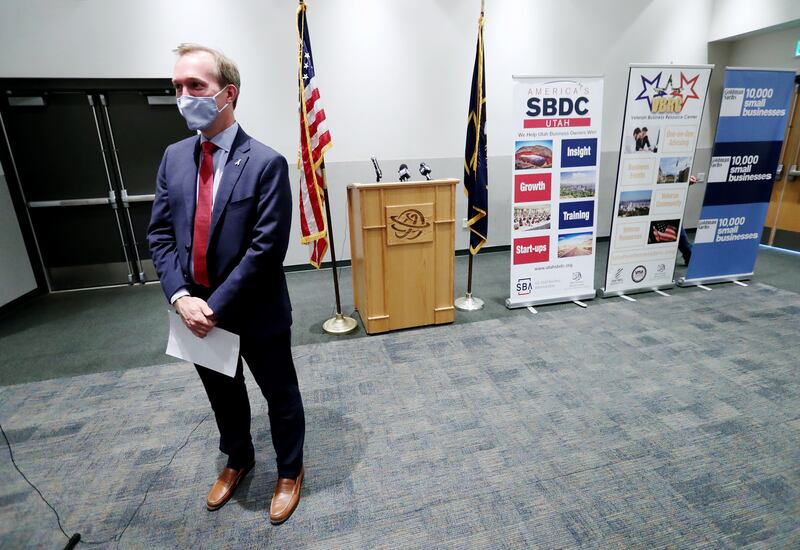SALT LAKE CITY — With a final deadline just days away, some 50,000 Utah businesses have collectively been approved for over $5.2 billion in potentially forgivable emergency funding via the federally backed Paycheck Protection Program.
The unprecedented economic injection has kept businesses afloat and earnings streaming to Utah workers amid the COVID-19 outbreak, but whether it’s enough to bolster the economy through a second wave of the pandemic remains an unanswered question.
U.S. Rep. Ben McAdams, D-Utah, said the funding has become “blood in the veins of the Utah economy” while keeping businesses afloat and money flowing to hundreds of thousands of local workers and their families.
“I think it’s safe to say it’s been a lifeline to Utah small businesses and their employees,” McAdams said. “It’s kept people getting paid that otherwise would not have and allowed them to put food on the table, pay rent and mortgages ... and helped those individuals and their families to keep moving forward.”
The Paycheck Protection Program provides federally guaranteed loans to eligible small businesses in amounts up to $10 million and may be forgivable. The available financing can provide businesses that employ 500 or fewer people with funds equal to 2.5 times the company’s average monthly payroll expenses. The program launched in early April with funding from the $2.2 trillion federal stimulus package approved by Congress in mid-March and was later refunded by federal lawmakers. So far, the effort has approved loans to 4.7 million U.S. businesses totaling nearly $515 billion.
Salt Lake Chamber President and CEO Derek Miller said the funding has been a critical financial backstop for businesses that were either limited or completely shut down by COVID-19 restrictions both in Utah and across the country.
“I think it would be difficult to overstate just how important the Paycheck Protection Program loans were, not just to the Utah economy but really for the entire country,” Miller said. “The funding saved businesses and, by extension, the jobs associated with those businesses and by extension of that, the livelihoods of so many individuals and families in Utah.”
Miller said the federal government would not ever be able to offer financial assistance at a level that could balance out a complete shutdown of the U.S. economy, but via programming like the Paycheck Protection Program and other efforts, was able to help blunt the worst of the economic impacts brought on by the novel coronavirus pandemic.
He also noted that modifications made to the program, like extending the allowable window for spending the emergency funding, will help ensure that as many Utah businesses as possible can earn complete forgiveness of the loans.
Utah Bankers Association President and CEO Howard Headlee said the depth and breadth of the federal assistance is without precedent but was necessary to match the severity of an equally extraordinary public health crisis.
“The (Paycheck Protection Program) was scaled to offset a very impressive and expansive economic crisis,” Headlee said. “Assuming we can navigate our way out of this phase of it cleanly, I think we’ll look back on the program as a significant benefit to offset the significant impact of COVID-19.”
Headlee said he is, however, concerned that a failure to reign in the spread of the disease could lead to revisiting the dire economic conditions experienced early on in the pandemic but without the resources to address them.
“If we end up slipping backward, I don’t anticipate we’ll see another program like this,” Headlee said. “And our economy will be exposed and that’s what we’re worrying about at this point.”
McAdams noted that the Paycheck Protection Program funding comes to an end on Tuesday and that no follow-up funding efforts are currently under consideration by Congress. He said he expected that any subsequent emergency funding or loan programs would be more focused and likely available to a much smaller pool of candidates. He also shared concerns about the impacts federal COVID-19 related funding was having on the national debt.
“I continue to be concerned about doing what we need to to get through this crisis,” McAdams said. “But I’m also very concerned about the levels to which our debt is rising.”
Utah Republican Sen. Mitt Romney shared a similar take on any redux of the Paycheck Protection Program at a Silicon Slopes event earlier this week, noting any further federal programming would need to be narrowly tailored to find support among his colleagues. And he and McAdams also agree that the $600 federal stipend that’s been buttressing the spending ability of those pushed onto unemployment rolls will not be extended beyond its current July 31 termination date.
One point of agreement among those watching the economies of Utah and the country is the importance of a collective commitment to follow the guidance of public health officials.
Miller noted the chamber has just launched a program aiming to “inform and support businesses in following COVID-19 guidelines from the Utah Department of Health.” McAdams said wearing a mask and following guidelines came down to a simple matter of “showing care and compassion for your fellow neighbor.”
And on a day in which new Utah COVID-19 cases hit yet another record high, Headlee warned the billions in federal emergency funding could be rendered moot by a virus resurgence.
“We could lose all the benefit of the $5.2 billion if we can’t somehow maintain some kind of reasonable level of infection,” Headlee said. “These funding efforts ... everything we’ve done is based on the assumption of a temporary situation. We need to do everything we can to maintain the validity of that assumption. We can all start by putting a mask on. If the assumption proves invalid, there’s a lot more pain than what people are prepared for coming our way.”


